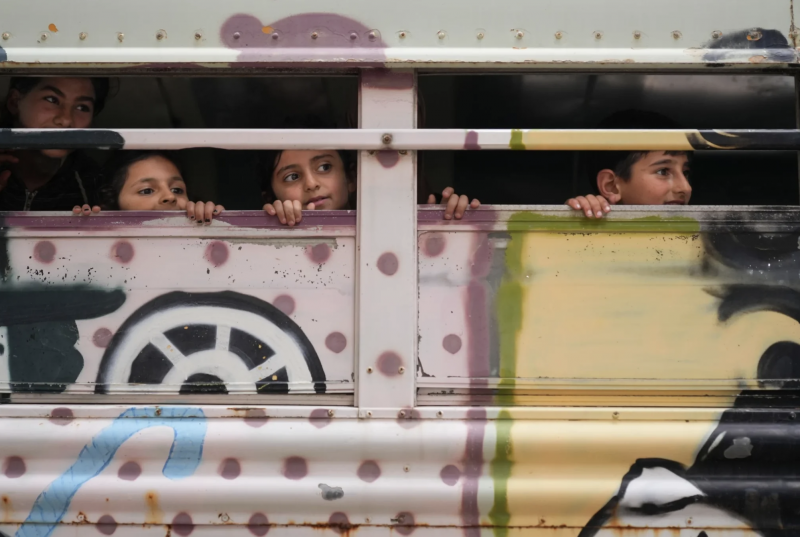
Displaced children from south Lebanon on the Tiro association bus, April 30, 2024 in Sour. (Credit: Mohammad Yassine)
The sound of an engine purr in the schoolyard and rhythmic horn beeping was the signal they had been waiting for. A swarm of children rushed towards the graffiti-covered school bus of Tiro Association for Arts, from which children’s music is played through speakers.
“Sit down,” its founder Kassem Istanbouli shouted in vain to the children dancing while standing on the seats, thrilled by the chance to escape just for a few hours from their dreary daily lives in the schools of Sour, where they have taken refuge with their families from the Israeli bombardments that have been raging in the south.
 Displaced children from south Lebanon enjoy themselves on the Tiro association bus, April 30, 2024 in Sour. (Credit: Mohammad Yassine)
Displaced children from south Lebanon enjoy themselves on the Tiro association bus, April 30, 2024 in Sour. (Credit: Mohammad Yassine)
No less than 30,000 Lebanese children have been displaced from the border villages ravaged by seven months of war between Israel and Hezbollah, in the wake of the Gaza war.
On April 30, the UNICEF Representative in Lebanon, Edouard Beigbeder, expressed concern about the “profound and long-term impact the violence is taking on children’s safety, health and access to education.”
Those sleeping in the schools of Sour are a minority of the underprivileged, most of whom are staying with relatives or in rented houses.
Istanbouli has been transporting hundreds of displaced children from schools to the theater several times per week for the past three months.
“We want to ease the psychological strain the war has caused them through art therapy. Here, they can express themselves through theater, drawing, photography, handicrafts, the stories they write or puppet theater,” said the theater performer, who dedicated his life to making culture accessible in Lebanon’s marginalized areas.
 Displaced children from south Lebanon in the Tiro association bus alongside its founder Kassem Istanbouli, April 30, 2024 in Sour. (Credit: Mohammad Yassine)
Displaced children from south Lebanon in the Tiro association bus alongside its founder Kassem Istanbouli, April 30, 2024 in Sour. (Credit: Mohammad Yassine)
Some children climbed the stairs to join painting teacher Bahia Zayad, who was waiting for them with pencils and paper in a room decorated with old film posters and reels. Others climbed onto the theater stage and began vocal and physical warm-ups with Istanbouli.
“It’s the only way they have right now to express themselves and learn,” he said, adding that “nothing can bring back to these children what they’ve lost except the end of the war and return home.”
In the back of the hall, Mariam, 16, and Naama, 26, watched their three little sisters running between the theater aisles. They seemed too old for these games, as if childhood were a distant memory for them. “In Boustan, we had 400 goats. Only 100 stayed alive in the bombardments or didn’t die in the phosphorus pollution. We’ve lost almost everything. It’s hard mentally, but we have to stay strong,” said the eldest.
Photography is her hobby. With the volunteers at Tiro Association, they went out several times to take photos of the streets of Sour and she has taken a liking to it. “Coming here has been a reminder that there’s still something good in life,” she said.
 Kassem Istanbouli teaches the rudiments of theater to displaced children in the Lebanese National Theater, April 30, 2024 in Sour. (Credit: Mohammad Yassine)
Kassem Istanbouli teaches the rudiments of theater to displaced children in the Lebanese National Theater, April 30, 2024 in Sour. (Credit: Mohammad Yassine)
Sitting in a circle on the boards, the children told stories, bickered and had fun. They came from Marwahine, Boustan, Dhaira, Bint Jbeil or Beit Lif.
“The theater has brought them together,” said Istanbouli, who encourages the young people to write their stories in the past and future tenses. “We don’t talk about the present, which is linked to the war. We try to link their childhood memories to their dreams for the future because the war has stolen their dreams and their little stories of everyday life.”
“I want to be a writer,” said Rawan, 19, from Aita al-Shaab. “I want to become an investigator of international crimes,” said Sally, next to her. It was 5 p.m. and the children had to get back on the bus and spend the night in dark, squalid classrooms until the war is over.
“The hardest thing,” said Istanbouli, “is the uncertainty.” “At first they thought they’d stay a week, then once Ramadan is over. Every time, their hopes of returning are dashed. In the meantime, we defy war through art,” he said. “It’s an act of resistance,” he concluded.
This article was originally published in L'Orient-Le Jour. Translated by Joelle El Khoury.